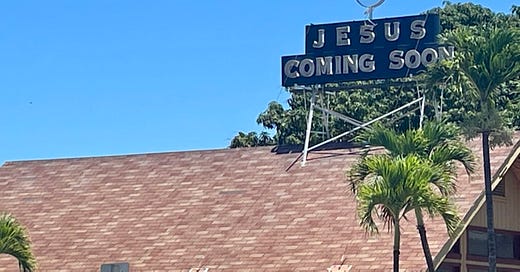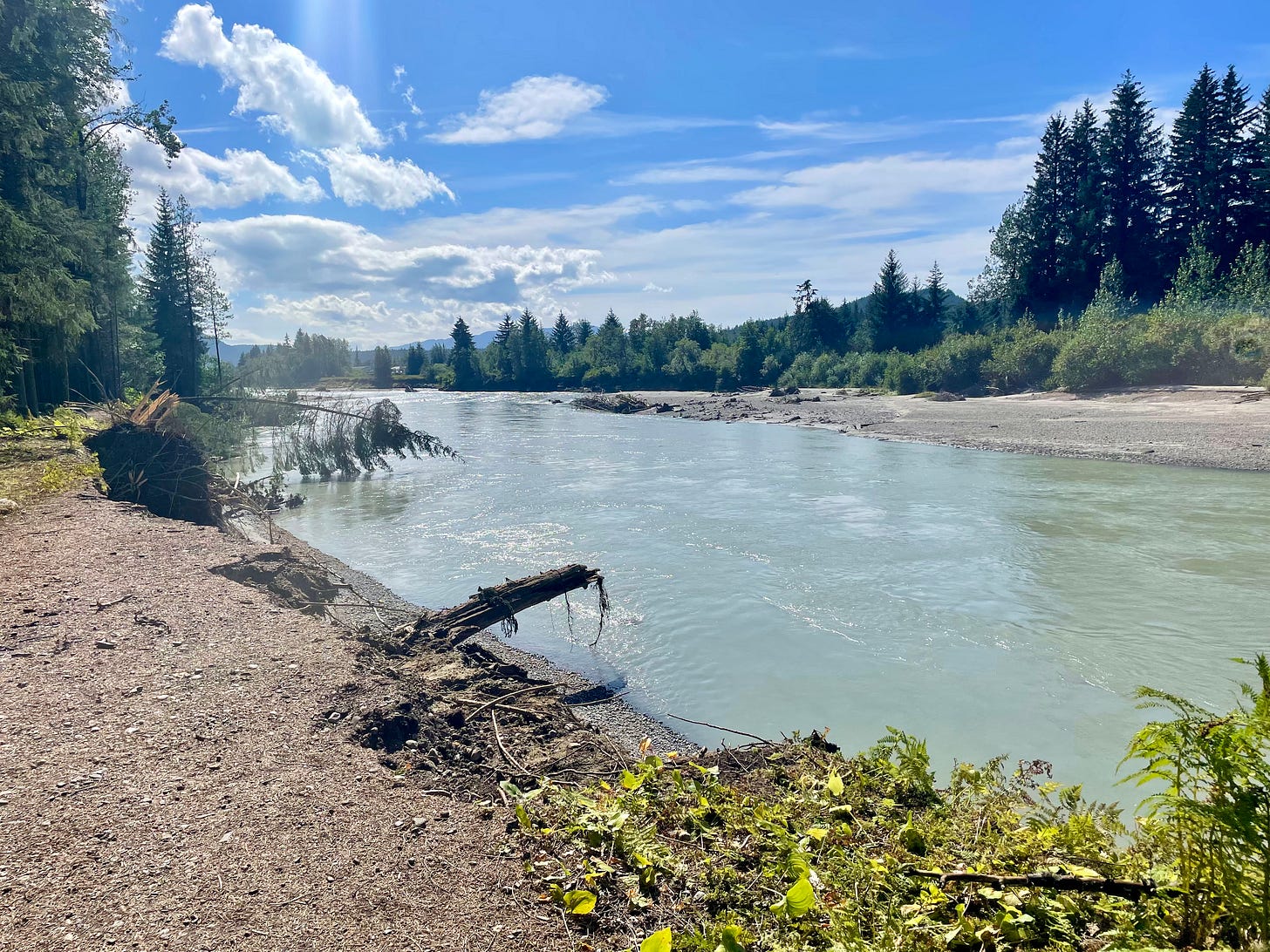Late mid-summer greetings readers. The recent anniversary of the tragic fires in Lahaina, Maui and closer to home, a glacial outburst flood that for two consecutive years brought evacuations, damaged homes, ruined possessions and lost vehicles reminded me of an essay I started one year ago. I share it with you here.
August 2023
JESUS, COMING SOON
They call it paradise
I don't know why
You call someplace paradise
Kiss it good bye
- The Last Resort, The Eagles
To the creeks near our home, salmon return to the place from where they hatched. After four years of surviving predators and dodging fishermen, some appear out of energy to swim upstream. Their stinky carcasses litter the creek and bank. But new life is underway. My dad leans his gangly self over the side of the bridge, fascinated as a four-year-old by the fish pairing up below. “That’s the female wriggling a bed in the gravel for her eggs,” I tell him. “The one shimmying at her side is the male who will fertilize them.” Going on 93, dad’s largely lost his short-term memory. But he is all in this moment, witnessing chum salmon, coming home.
In the coves out the road, you can hear the guttural breaths of humpback whales rising to the surface for a hit of oxygen. These same whales spend the winter fasting and mating in the waters where my brother takes his daily swim, off the Hawaiian island of Maui.
Three years ago, my brother and sister-in-law sold their home overlooking a freeway. They left San Diego for Maui, a plot of dirt and a wooden shell that would become a modest townhouse in a sprawling housing complex in Lahaina, a place historical and sacred to its original inhabitants.
In mid-July 2023, dad and I flew across the Pacific Ocean to visit. My brother and his wife seemed more relaxed than ever, easy smiles on sun infused faces. The first place they took us was an airy restaurant plopped on the edge of the ocean. The back “wall” nothing but white muslin fabric, filtering out the late day sun and letting through silhouettes of sailboats and paddleboards. We savored sea salted mahi mahi and sweet mango.
The bistro is just north of what the locals call Baby Beach, where Native Hawaiian families pull their trucks up to the shore and set up outdoor kitchens on the sand. The inviting scent of fresh grilled fish wafts in the warm air, while three generations play in the shallow water. A short stroll away, a teenager practices his swing on a makeshift mini-golf course in his grandfather’s beach backyard. Next door, couples tango at an open-air dance class as the sun sinks into the sea, turning the entire scene golden. A lone surfer rides a series of waves just high enough for a long, laid-back ride to shore.
This must be paradise.
Paradise is the name of a town in the foothills of California’s Sierra Nevada mountains, population, 27,000, decimated by the Camp Fire in 2018. Eighty-five members of that community lost their lives.
I am the first of six siblings who grew up in California, not far from the 2017 Wine Country Fire. It wrought searing images. The sun merging with the edge of a burning earth. A little girl with stringy hair and a soft face, clutching a charred bicycle where her home once stood, grey ashes and black soot, the moment her life shifted. A Santa Rosa neighborhood as if it’d been bombed, save for one intact cul-de-sac, the roofs clean and the lawns green.
In 1971 my parents bought a house in a cul-de-sac thirty-five miles south of Santa Rosa in a place called Terra Linda, beautiful land in Spanish. My high school alma mater was an evacuation center from the Wine County fire, victims taken to the hospital down the street.
My husband and I raised our two kids 2500 miles north along spruce, hemlock, and cedar trees in the largest contiguous coastal rainforest in the world. Here it rains so much, the weather service is challenged for descriptions. Scattered showers, widespread showers, rain showers likely, and the ever ambiguous mostly cloudy with a chance of rain. But to us, the mountains, glaciers, fjords, and islands inhabited by bear, salmon and mountain goats feel like paradise.
Lahaina is set on a narrow strip of land between a desert-like mountain canyon and the Pacific Ocean. Every year more than two million tourists visit this compact municipality of 13,000. Bumper to bumper trucks and SUV’s snake along the main drag, Front Street, while tourists crowd some semblance of sidewalk. On our week-long visit, we snorkeled with bright young fish and swam with a sage sea turtle.
Enroute to the Maui airport for our flight back to Alaska, I asked my brother to pull over. I hopped out, compelled to photograph what caught my gaze each time we passed it; the confounding words rising on stilts, all capital letters atop the church where Front Street met the highway: JESUS COMING SOON. The sign inspired a track on the societally self-aware album, Hotel California, released by The Eagles in 1977. On “The Last Resort”, Don Henley croons about escaping the shallowness of Los Angeles for Lahaina.
We returned home to a narrow strip of land nestled between the saltwater Inside Passage and the Juneau Icefield. While about fewer than 32,000 people live here, more than one and half million tourists disembark from cruise ships from mid-April to mid-October. They ply our main drag, South Franklin Street, built when gold mining birthed Juneau, the capital of Alaska. Some take buses away from downtown to where they can view the receding Mendenhall Glacier.
The following weekend, an annual ice dam release of melted glacier ice and snow raised the Mendenhall River to unprecedented levels. Residents who live along the river watched in awe and horror as the water temporarily rose, eroded banks, and took out old growth trees, one at a heartbreaking time. A video that went viral shows a house collapsing all-at-once into the river. Homes of our friends and fellow community members were flooded or deemed uninhabitable.
A few days later, my cellphone buzzed with a call from my brother. He sounded scared and shaken. “We’re almost out of gas. We just drove through palm trees and power lines on fire, falling around us,” he relayed, between breaths. His wife chimed in. “Katie, I’ve never seen anything like it, the black, billowing smoke.” They were pulling into a parking spot at the next tourist attraction north.
They’d barely made it out of Lahaina.
My brother and sister-in-law were fortunate to escape a literal hell on earth, where at least 100 people perished, some in their homes, or in cars stuck on the bridge I’d cruised along on a bicycle just days before.
A highlight of our stay was the celebration of my brother’s birthday at a lauded Front Street institution: The Lahaina Grill. A bright mural on the back wall reminiscent of Monet. Our attentive waiter Paul Newman’s double. Six of us gathered around a long table with white tablecloths, toasting the birthday boy with sparkling stemware. The table came with a roving staff photographer who snapped a lasting memory of our delighted faces.
The restaurant is disappeared now, along with the rest of downtown Lahaina, wiped out by a cauldron fueled by hurricane driven winds blowing down canyons igniting grasses left by fallow sugar cane and pineapple fields. Lahaina, at one time the capital of an Indigenous monarchy, decimated by a concoction of colonialism, capitalism, and climate change.
Since my children were born in the late 1980’s, the number of forests burning in western North America has risen with the temperature of the atmosphere. Fewer than ten years ago, the climate crisis was a suspect. Now it’s a convicted criminal, as the west turns tinder dry in record-breaking heat, floods in epic rainstorms, or is engulfed by glacial outbursts surging billions of gallons of water downstream.
I used to imagine the apocalypse as one big end of the world, wiped out by meteors or atomic bombs. Now, I wonder if we’re witnessing a trickle-down Armageddon, one staggering, home deleting natural disaster at a time.
Yet somehow, the flames missed my brother and sister-in-law’s townhouse. The Jesus is Coming Soon church survived one of the deadliest fires in United States history.
And the salmon swim upstream, against the current, home.
Thanks so much for reading and subscribing to my newsletter. Your comments are more than welcome. And if you liked it, please help grow our readership by clicking on the heart. -Katie B.






Wonderful, Katie. Love the way you wove the sign into the piece. We seem to be a mostly hopeful people. But the kind of destruction we are seeing today on so many fronts, is especially challenging. So glad to read about your dad. Glad he is visiting again. Excellent writing. Thanks for sharing.
A horrifying and powerful account of an awful year. As a resident of the West, the Great Basin specifically, wildfires and the smoke have become a normal summer thing. Normal! It rankles to write it, but it's true. Climate change is a culprit along with mismanagement from Forestry officials, ridiculously zealous and misguided arsonitss, anti-grazing laws in fire-prone areas, and an array of stupidity of people who have no idea how fire works. Fireworks at gender-reveal parties? Really?
A friend of mine who used to be a fire-spotter in Plumas County, CA told me he saw the initial plume of smoke of the Camp Fire and spent over an hour trying to convince Forestry Dept. people that it was growing fast and headed for Paradise. They said, "We'll take it under advisement. His knowledge of this incompetence cost him his job. A second fire unreported by the dufus who took his place in the tower has added another dozen ghosts to the 89 lost in Paradise that haunt him.
Thank you for your story. I'm glad your brother and his wife got out in time. And I'm glad you mentioned the salmon still swimming upstream to mate. Life prevails no matter what happens.